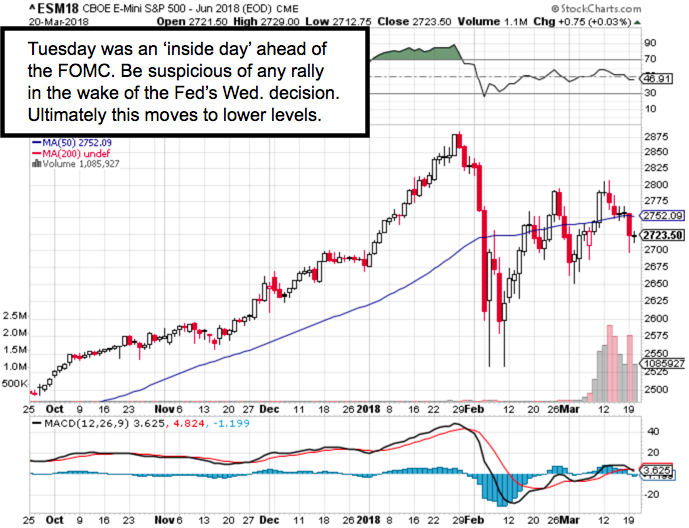Facebook hasn’t been clear that data might go beyond their data centers, and there is no decent way to track that. Facebook policies are lame and likely to be changed. That’s why there is potential pressure on earnings, writes Gene Inger Tuesday in The Inger Letter.
Markets welcome Spring with a pensive stance on equities, the credit market, and particularly the inference that social media harvesting of lots of data, challenges not just the political environment being focused-on of course; but the monetization of that data by Facebook and others. (We’d warned, suggesting sale of Facebook (FB) several weeks before the news.)
They retain data and without that, it becomes difficult to market to advertisers, as well as see how apps are being used to collect data for their own improvement, beyond marketing.
This matters to the future; as does the G-20 pressure for enforcement, or initiation, of taxation on internet commerce. The idea is that love-affairs, and perhaps profit margins, are gong to be challenged by all of this.

There will be government investigations trying to assure citizens, and compel social media companies, to be more transparent, and/or to give more control of what interactions are allowed to take place online.
The consumer perception of what’s going on, and the reality, is probably not as sinister as some of the media inferences but isn’t sufficiently very proactive in terms of protecting and emphasizing transparency for users.
They have resisted essentially because the product isn’t them, but for all practical purposes, the product is the customer or social media member themselves, precisely opposite of what most have presumed.
This is also why I disputed those cheerleaders saying you just have to buy Facebook here.
No, you don’t, and yes, it’s considerably lower after this Tuesday session as well.
People in a sense are sharing too much data; but some of it (like health apps) does help new technology.
One has to differentiate allowing access, and that’s something that goes beyond Facebook, and starts to impact Apple (AAPL) too, a huge proponent of apps, and which makes a larger chunk of revenue for sure from services and app revenue than most analysts acknowledge.
So yes, Facebook needs to be more transparent. Apple is already more focused on privacy and giving iPhone and Mac users more control of their privacy and data.
The Facebook model is far more limited, and up to now has not made it clear that data might go beyond their data-centers, and there is no decent way to track any of that, which makes Facebook policies lame and likely to be changed. To wit, that’s why there is a potential pressure on their actual earnings.












